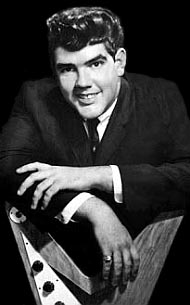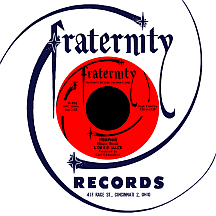LONNIE MACK
Memphis
One of Chuck Berry's best songs describes a man's frustration in attempting to reach his estranged six-year-old daughter by telephone. "Memphis, Tennessee" addresses a personal concern common in life yet seldom broached in a musical work. The brilliantly emotional song with its surprise-realization ending was relegated to a B side when released in 1959...but deserved to be a hit. And it was, four years later, only as an instrumental! And a rocking one at that! It happened quite by accident when 22-year-old electric guitarist Lonnie Mack, part of the studio band backing girl group The Charmaines on a session in March 1963, suddenly had a few minutes of scheduled time remaining and tore off a rousing version of the song he'd been performing live for some time, the lyrics replaced by improvised picking on his Gibson Flying V. He and the band had their fun and then forgot about it until the record label, Fraternity, decided to release Mack's track on a 45. With the shortened title "Memphis," the record started climbing the charts...but Lonnie was clueless about the whole thing!
Lonnie McIntosh grew up in Harrison, Indiana, about 25 miles west of Louisville, Kentucky. Fraternity Records was established in 1954 in Cincinnati, Ohio, another hundred miles to the east, around the time Lonnie was hitting his teens; he'd spent the early years of his life learning guitar, playing bluegrass tunes and making plans to start a band. By the late '50s he was a fixture of the Tri-State club scene, heading a group called The Twilighters, performing in various roadside bars between Louisville and Cincy. The Flying V guitar, named for its space-age upside-down design, was introduced in 1958 (Gibson president Ted McCarty said he wanted a "futuristic" model for his guitar line). Attracted by its unusual look, Lonnie was among the first to own one. In the early '60s he worked as a session musician for King-Federal, Cincinnati's more famous record company, regularly contributing to hits by Hank Ballard and the Midnighters, James Brown and others, often shuttling between King's studio on the north end of town and Fraternity's downtown facility.
Lonnie (who'd shortened McIntosh to Mack) was out on the road with country singer-songwriter Troy Seals in the spring of '63 when a friend tipped him off that "Memphis" was breaking big at radio; the single went top ten in June and stayed there throughout July. He followed it that summer with the forceful "Wham!," a top 30 hit in September, and a conspicuously-titled album, The Wham of That Memphis Man. The highways of America beckoned as he was booked into higher-profile clubs, fairs and assorted stages, proceeding to rack up the miles on his Cadillac and wear down the frets on his Flying V. Fans familiar with his instrumentals were usually surprised to find he sang and included several blues-rock numbers in each set. Vocal tendencies became apparent with his third single, the late-'63 charter "Baby, What's Wrong," an intensified take on a two-year-old Jimmy Reed tune with backing vocals by the Charmaines, whose work with Mack is perhaps what they're best known for (a minor 1961 Fraternity disc, "What Kind of Girl (Do You Think I Am)," was the closest the group, led by "Gigi" Jackson, ever came to having a hit of their own).

Then "Memphis" was a hit, again, one year after Mack's instrumental smash. A version recorded at Hollywood, California's Whisky a Go Go club by Johnny Rivers (who'd been making records for six years without luck) became his career breakout (top ten in June and July '64); Berry's beautifully poignant set of lyrics ('Last time I saw Marie she was waving me goodbye...hurry home drops on her cheek that trickled from her eye...') had finally found the mass audience it deserved, win-win-win for Chuck, Lonnie and Johnny! The walls of Fraternity's studio shook with hot Mack tracks like "Lonnie on the Move" (a driving instro remake of Bobby "Blue" Bland's "Turn on Your Lovelight"), "I've Had It" (a brain-blasting Mack-Charmaines reworking of The Bell Notes' 1959 hit), "Chickin' Pickin'," an original with a fast-finger fret technique to be reckoned with, and an easy surf-style instrumental version of "Don't Make My Baby Blue," the Barry Mann-Cynthia Weil song that had put Frankie Laine back on the map the previous year.
Clearly having a blast on the road and in the recording studio, Mack returned to the charts with "Honky Tonk '65" in the fall of that year, adding his own chapter to the multi-part Bill Doggett standard. He went on a country kick with a ballad, "Are You Guilty?," a softer-than-usual batch of finger-pickin' tunes including Buck Owens' "Buckaroo" and other selections that counteracted people's expectations. He produced "Soul Serenade" (the King Curtis instrumental) for Beau Dollar and the Coins (the stage name for drummer William Hargis Bowman). With "Save Your Money" in 1967, Mack's own work took on a more soulful essence. He signed with Elektra Records, did considerably more singing the next few years, and sidetracked into bass playing, contributing to The Doors' sessions for the album Morrison Hotel.
In the early 1970s, Lonnie worked with Ed Labunsky, a successful commercial jingle songwriter, on a country-rock project called South. Later he and Texas-based blues guitar whiz Stevie Ray Vaughan gigged and recorded together for Alligator Records. The man with the vintage Flying V axe never really had the need to try to make a comeback...because he hadn't gone away. His impressive reputation preceded him; the top stars of rock have sought to watch him perform, work with him, learn from him. Lonnie Mack always had the knack; he just kept on pickin', hammerin' away and rockin' out!


